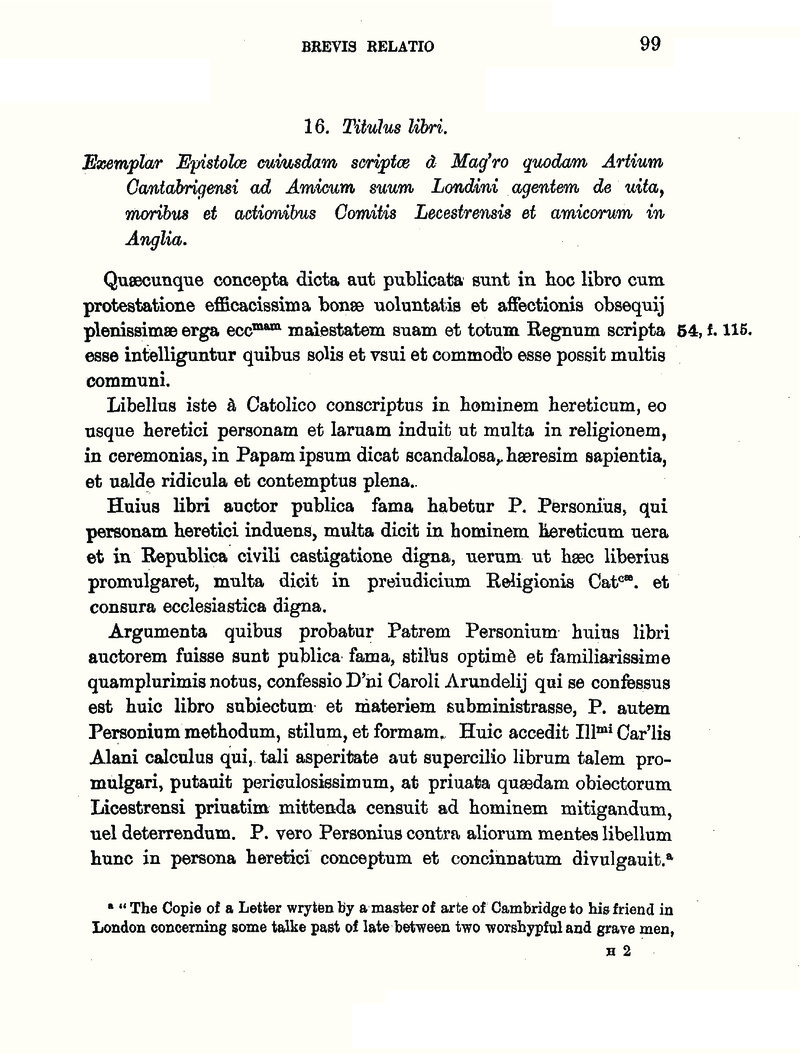No CrossRef data available.
Article contents
16. Titulus libri: Exemplar Epistolæ cuiusdam scriptæ à Mag'ro quodam Artium Cantabrigensi ad Amicum suum Londini agentem de uita, moribus et actionibus Comitis Lecestrensis et amicorum in Anglia
Published online by Cambridge University Press: 24 December 2009
Abstract

- Type
- II. Brevis Relatio
- Information
- Copyright
- Copyright © Royal Historical Society 1898
References
Page 99 note a “The Copie of a Letter wryten by a master of arte of Cambridge to his friend in London concerning some talke past of late between two worshypful and grave men, about the present state, and some procedinges of the Erie of Leycester and his friendis in England,” 1584, n.p. It was reprinted under the title of “Leicester's Commonwealth.” Quite apart from Parsons' very explicit denial of the authorship (Preface to his Warnword, 1602), it is incredible that he should have written it, and the passages here quoted should be alone sufficient to prove this. Mary Stuart, writing to the Archbishop of Glasgow in May 1586, and referring to the book as written “nearly two years ago,” declares that Leicester believed it was written by Morgan with the archbishop and Lord Paget; that the earl in consequence “was in the utmost rage against all three,” and had procured the imprisonment of Morgan. Turnbull, discussing the question in his Introduction to the Letters of Mary Stuart, xvii–xxi), cites the arguments of Dr. Ashton and Dean Mosse in favour of the opinion that the book was “the work of some subtle courtier who for safety got it printed abroad and sent into England under the name of Persons,” and quotes a letter from Tierney who considers Ashton's arguments from internal evidence “quite conclusive.” But it is significant that the scandalous duplicity and disloyalty towards his church attributed to Parsons, on the supposition that he wrote the book, should have created no difficulty in the minds of the appellants.
Page 101 note a “By Leicester's chancellorship of Oxford,” says the author, “is cancelled almost all hope of good in that University: and by his protection, it is like soone to come to destruction… it were sufficient to behold the present state of the two Universities whereof they [Leicester and Cecil] are heads and governors. For our owne [Cambridge] I will not say much, lest I might seeme partiall: but let the thing speak for itselfe. Consider the fruit of the Garden, and thereby you may judge of the Gardiner's diligence. Look upon the Bishopricks, Pastorships, and Pulpits of England and see whence principally they have received their furniture for the advancement of the Gospell. And on the contrary side, look upon the Seminaries of Papistry at Rome and Rhems, upon the Colledges of Jesuists, and other Companies of Papists beyond the seas and see where-hence they are, especially, fraught.” Edit. 1641, p. 69.
Page 101 note b “At these words the old Lawyer stepped back, as somewhat astonied, and began to make Crosses in the ayre, after their fashion, whereat wee laughed.” Margin “Papisticall blessing” (p. 101).


